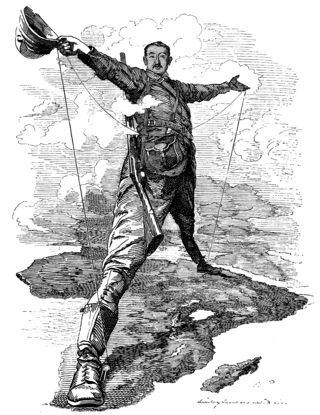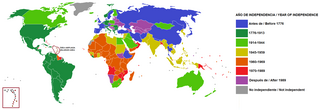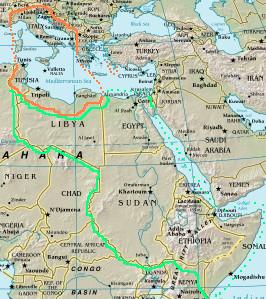See also
| | This film genre–related article is a stub. You can help Wikipedia by expanding it. |
Colonial cinema is cinema produced by a colonizing nation in and about their colonies. While typically seen as a Western phenomenon, non-Western countries, most notably Imperial Japan, also had colonial cinemas. Colonial films typically idealize life in the colonies by emphasizing the modernizing aspects of colonization. Feature films set in colonial settings typically represent them as refuges for colonizers looking to escape life in the metropole. As a result, colonial films frequently do not attempt to reflect the social realities of life in colonized countries. Representations of local characters, places, and customs are regularly presented as escapist, apologetic or overtly racist. Today colonial cinema is an important source to understand the mentality of the colonizing societies.

A colony is a territory subject to a form of foreign rule. Though dominated by the foreign colonizers, the rule remains separate to the original country of the colonizers, the metropolitan state, which together have often been organized as colonial empires, particularly with the development of modern imperialism and its colonialism. This coloniality and possibly colonial administrative separation, while often blurred, makes colonies neither annexed or integrated territories nor client states. Colonies contemporarily are identified and organized as not sufficiently self-governed dependent territories. Other past colonies have become either sufficiently incorporated and self-governed, or independent, with some to a varying degree dominated by remaining colonial settler societies or neocolonialism.

Colonialism is the pursuing, establishing and maintaining of control and exploitation of people and of resources by a foreign group. Colonizers monopolize political power and hold conquered societies and their people to be inferior to their conquerors in legal, administrative, social, cultural, or biological terms. While frequently advanced as an imperialist regime, colonialism can also take the form of settler colonialism, whereby colonial settlers invade and occupy territory to permanently replace an existing society with that of the colonizers, possibly towards a genocide of native populations.

Imperialism is the practice, theory or attitude of maintaining or extending power over foreign nations, particularly through expansionism, employing both hard power and soft power. Imperialism focuses on establishing or maintaining hegemony and a more or less formal empire. While related to the concepts of colonialism, imperialism is a distinct concept that can apply to other forms of expansion and many forms of government.

Colonization is a process of establishing control over foreign territories or peoples for the purpose of exploitation and possibly settlement, setting up coloniality and often colonies, commonly pursued and maintained by colonialism.

The French colonial empire comprised the overseas colonies, protectorates, and mandate territories that came under French rule from the 16th century onward. A distinction is generally made between the "First French colonial empire", that existed until 1814, by which time most of it had been lost or sold, and the "Second French colonial empire", which began with the conquest of Algiers in 1830. On the eve of World War I, France's colonial empire was the second largest in the world after the British Empire.

Decolonization is the undoing of colonialism, the latter being the process whereby imperial nations establish and dominate foreign territories, often overseas. The meanings and applications of the term are disputed. Some scholars of decolonization focus especially on independence movements in the colonies and the collapse of global colonial empires.

The term "Cinema of Korea" encompasses the motion picture industries of North and South Korea. As with all aspects of Korean life during the past century, the film industry has often been at the mercy of political events, from the late Joseon dynasty to the Korean War to domestic governmental interference. While both countries have relatively robust film industries today, only South Korean films have achieved wide international acclaim. North Korean films tend to portray their communist or revolutionary themes.
Postcolonial feminism is a form of feminism that developed as a response to feminism focusing solely on the experiences of women in Western cultures and former colonies. Postcolonial feminism seeks to account for the way that racism and the long-lasting political, economic, and cultural effects of colonialism affect non-white, non-Western women in the postcolonial world. Postcolonial feminism originated in the 1980s as a critique of feminist theorists in developed countries pointing out the universalizing tendencies of mainstream feminist ideas and argues that women living in non-Western countries are misrepresented.

The German colonial empire constituted the overseas colonies, dependencies, and territories of the German Empire. Unified in 1871, the chancellor of this time period was Otto von Bismarck. Short-lived attempts at colonization by individual German states had occurred in preceding centuries, but Bismarck resisted pressure to construct a colonial empire until the Scramble for Africa in 1884. Claiming much of the remaining uncolonized areas of Africa, Germany built the third-largest colonial empire at the time, after the British and French. The German colonial empire encompassed parts of several African countries, including parts of present-day Burundi, Rwanda, Tanzania, Namibia, Cameroon, Gabon, Congo, Central African Republic, Chad, Nigeria, Togo, Ghana, as well as northeastern New Guinea, Samoa and numerous Micronesian islands.

The decolonisation of Africa was a series of political developments in Africa that spanned from the mid-1950s to 1975, during the Cold War. Colonial governments gave way to sovereign states in a process often marred by violence, political turmoil, widespread unrest, and organised revolts. Major events in the decolonisation of Africa included the Mau Mau rebellion, the Algerian War, the Congo Crisis, the Angolan War of Independence, the Zanzibar Revolution, and the events leading to the Nigerian Civil War.

A colonial empire is a collective of territories, either contiguous with the imperial center or located overseas, settled by the population of a certain state and governed by that state.

The historical phenomenon of colonization is one that stretches around the globe and across time. Ancient and medieval colonialism was practiced by the Phoenicians, Greeks, Romans, Turks, Han Chinese, and Arabs.

Black Girl is a 1966 French-Senegalese drama film, written and directed by Ousmane Sembène in his directorial debut. It is based on a short story from Sembène's 1962 collection Voltaique, which was in turn inspired by a real life incident. Black Girl stars Mbissine Thérèse Diop as Diouana, a young Senegalese woman who moves from Dakar, Senegal to Antibes, France to work for a French couple. In France, Diouana hopes to continue her former job as a nanny and anticipates a new cosmopolitan lifestyle. However, upon her arrival in Antibes, Diouana experiences harsh treatment from the couple, who force her to work as a servant. She becomes increasingly aware of her constrained and alienated situation and starts to question her life in France.

Imperialism, colonialism and irredentism played an important role in the foreign policy of Fascist Italy. Among the regime's goals were the acquisition of territory considered historically Italian in France and Yugoslavia, the expansion of Italy's sphere of influence into the Balkans and the acquisition of more colonies in Africa. The pacification of Libya (1923–32), the invasion of Ethiopia (1935–36), the invasion of Albania (1939), the invasion of France (1940), the invasion of Greece (1940–41) and the invasion of Yugoslavia (1941) were all undertaken in part to add to Italy's national space. According to historian Patrick Bernhard, Fascist Italian imperialism under Benito Mussolini, particularly in Africa, served as a model for the much more famous expansionism of Nazi Germany in Eastern Europe.
Postcolonialism is the critical academic study of the cultural, political and economic legacy of colonialism and imperialism, focusing on the impact of human control and exploitation of colonized people and their lands. The field started to emerge in the 1960s, as scholars from previously colonized countries began publishing on the lingering effects of colonialism, developing a critical theory analysis of the history, culture, literature, and discourse of imperial power.

The territorial conquests of the Japanese Empire in the Western Pacific Ocean and East Asia began in 1895 with its victory over Qing China in the First Sino-Japanese War. Subsequent victories over the Russian Empire and the German Empire expanded Japanese rule to Taiwan, Korea, Micronesia, southern Sakhalin, several concessions in China, and the South Manchuria Railway. In 1931, Japan invaded Manchuria, resulting in the establishment of the puppet state of Manchukuo the following year; thereafter, Japan adopted a policy of founding and supporting puppet states in conquered regions. These conquered territories became the basis for the Greater East Asia Co-Prosperity Sphere in 1940.

Settler colonialism is a logic and structure of displacement by settlers, using colonial rule, over an environment for replacing it and its indigenous peoples with settlements and the society of the settlers.
Cinema in Togo began with German colonial filmmakers visiting Togoland. The French attempted to suppress cinema in French Togoland. After the Togolese Republic gained independence in 1960, Togo's national government encouraged cinema, though government support for cinema lapsed when French funding was withdrawn in the 1990s. More recently, however, the film industry is once again growing in Togo.
The Colonial Land and Emigration Commission (CLEC), also known as the Colonial Land and Emigration Board, was a British government authority under the supervision of the Secretary of State for the Colonies that facilitated emigration within the British Empire. Established by a formal commission from Queen Victoria on 14 January 1840, the commission took over the responsibilities of two existing government offices, the South Australian Colonization Commission, and the Agent-General for Emigration.